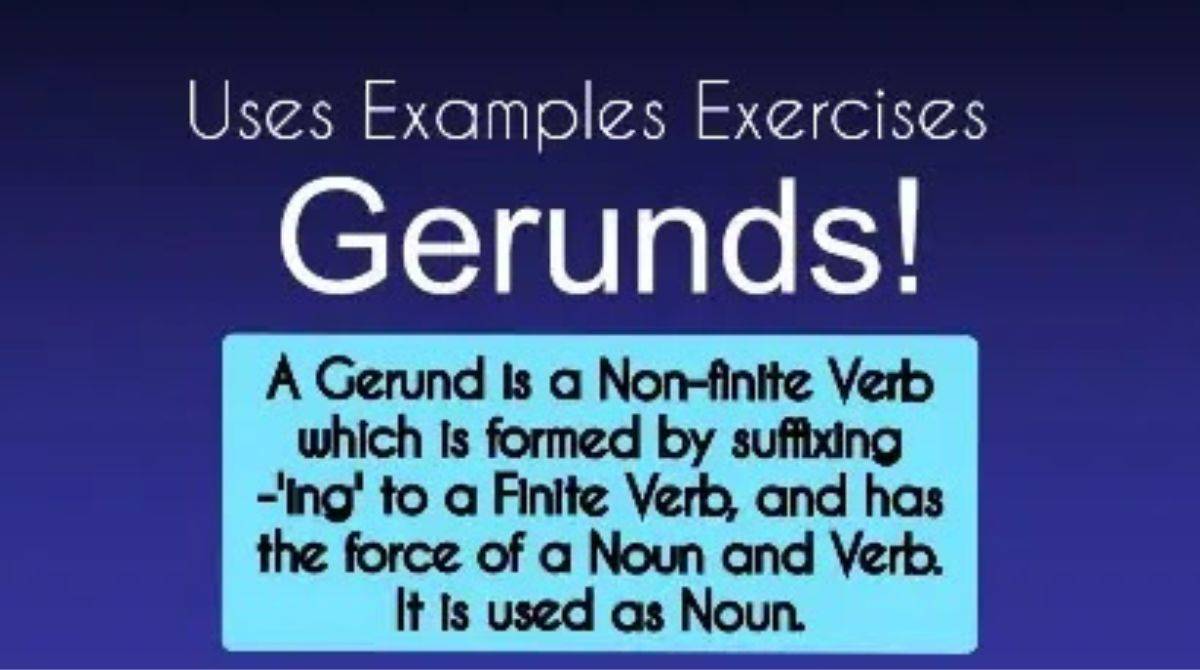What is Gerund
A Gerund is a Non-finite verb which is formed by suffixing -‘ing’ to a Finite Verb, and has the force of a Noun and a Verb. It is used as Noun.
Uses of Gerund in English Grammar:
The Gerund is used in following ways
1 As the subject of a Verb:
i) Walking is a good exercise
ii) Smoking is injurious to health.
iii) Hunting deer is not allowed in this country.
2 As the Object of a Transitive Verb:
i) Stop reading now.
ii) I like reciting poems.
iii) Children love playing football.
3 As the Object of a Preposition:
i) He is fond of reading ghost stories.
ii) I don’t believe in using mobile phone in school.
iii) I was prevented from entering the stadium.
4 As the Complement Verb:
i) Seeing is believing.
ii) What I most detest is smoking.
iii) His favourite pass time is reading.
5 As Absolute Phrase:
i) Playing cards being their hobby, they play cards in the crowded train.
6 As a part of Compound Noun:
i) Walking-stick
ii) Laughing-gas
iii) Drawing-room.
7 As a Compound Gerund:
i) I am tired of having listened so much.
ii) The man was charged with having sheltered a terrorist.
iii) I heard of having topped the list.
8 Following a Possessive Adjective or Noun:
i) I hope you will excuse my leaving early.
ii) I was pleased at his visiting my place.
Exercise Gerund and Participle:
Point out the Gerund and Participle in the following sentences:
1. He has ruined his sight by reading small print.
2. Walking on the glass was forbidden.
3. The miser hated spending money.
4. Asking question is easier than answering them.
5. Jumping over the fence, the thief escaped.
6. We saw a clown standing on his head.
7. The boy was ashamed of being beaten in his class.
8. Playing football helps him to grow stronger.
9. They spent the afternoon in playing cards.
10. Hearing the noise he woke up.
11. He was found painting his own shirt.
12. I can’t go on doing this monotonously.
Frequently Asked Questions on Gerund and Participle:
1. What is the difference between Gerund and Participle?
Ans: As both the Gerund and Present Participle end in – ‘ing’, they must be distinguished. The Gerund has the force of a Noun and a Verb whereas, the Present Participle has the force of an Adjective and a Verb.
Examples of Gerund:
i) He is fond of playing cricket.
ii) The old man was tired of walking.
iii) I don’t like laughing so loud.
Examples of Participle:
i) Playing cricket, he gained health.
ii) Walking along the road, he noticed a dead cobra.
iii) They went away laughing.
2. What is the difference between Gerund and Infinitive?
Ans: As both the Gerund and Infinitive have the force of a Noun and Verb, they have the same uses.Thus, in many sentences either of them may be used without any special difference in meaning. In modern grammar, the difference between Simple Infinitive and Gerundial Infinitive is not stressed as both of them may be transformed into a Gerund.
Examples of Infinitive:
i) To walk is good for health.
ii) To find fault is easy.
Examples of Gerund:
i) Walking is good for health.
ii) Finding fault is easy
3. Are all Verbal Nouns Gerund?
Ans: A Verbal Noun is a verbal in- ‘ing’ with the definite article before and the preposition after it. It is noted that all Verbal Nouns are not Gerund but all Gerunds are Verbal Nouns.
Examples:
i) He is engaged in the writing of a short story.
ii) He likes the reading of a science fiction.
You May Like To Read More:
